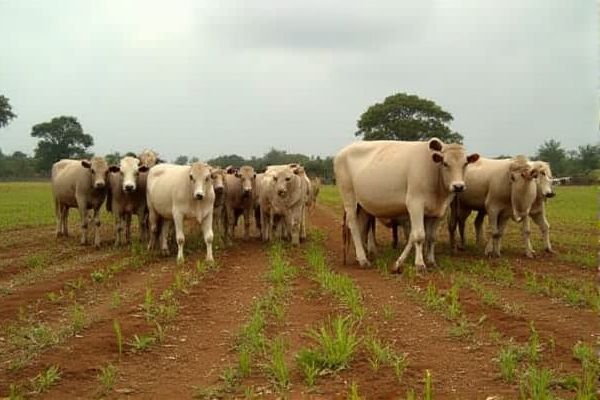
Agricultural economics in Zambia offers various job opportunities across multiple sectors, including government agencies, NGOs, and private corporations. Positions may include roles such as agricultural policy advisors, market analysts, and researchers, focusing on enhancing agricultural productivity and economic development. Those with expertise in sustainable farming practices and rural development can contribute to initiatives aimed at improving food security and income generation for farmers. Professionals in this field also engage in data analysis and economic modeling to inform policy decisions that impact the agricultural landscape in Zambia.
Job Description
Agricultural economics jobs in Zambia focus on analyzing economic principles related to the agricultural sector, promoting efficient production and marketing strategies. Professionals in this field evaluate the impact of policies on agricultural sustainability and food security, providing recommendations for improvements. Positions often require expertise in data analysis, market research, and financial management to support farmers and agribusinesses. You can contribute to the development of rural economies and enhance the livelihoods of communities through strategic interventions and innovative practices.
Requirement
In Zambia, agricultural economics jobs often require a strong understanding of economic principles as they apply to agricultural systems. Employers typically seek candidates with a degree in agricultural economics, economics, or a related field, along with practical experience in the agricultural sector. Proficiency in data analysis and familiarity with agricultural policy can set you apart in this competitive job market. Communication skills are also essential, as you will need to convey complex economic concepts to farmers, policymakers, and other stakeholders effectively.
Salary and Perks Expected
Agricultural economics jobs in Zambia typically offer competitive salaries that reflect the country's growing focus on agricultural development and food security. Entry-level positions generally start with salaries ranging from ZMW 5,000 to ZMW 10,000 per month, while experienced professionals can earn upwards of ZMW 15,000 to ZMW 25,000 monthly. In addition to salary, many employers provide perks such as health insurance, transport allowances, and opportunities for professional development. Understanding the market demand and economic trends can enhance your prospects in this thriving sector.
Similar Job Names
- Agricultural Economist
- Farm Manager
- Policy Analyst
- Agricultural Consultant
- Research Assistant
- Agricultural Development Specialist
- Rural Development Officer
- Crop Production Analyst
- Livestock Economist
- Agricultural Marketing Specialist
- Food Security Analyst
- Natural Resource Economist
- Agribusiness Manager
- Extension Services Coordinator
- Economic Development Officer
- Supply Chain Analyst
- Project Manager (Agricultural Projects)
- Microfinance Advisor (Agriculture Sector)
- Trade Policy Analyst
- Agricultural Data Analyst
Job Expectation Concept
Agricultural economics jobs in Zambia focus on improving agricultural productivity, market access, and rural development. Professionals in this field analyze economic data to inform policies and strategies that enhance the livelihoods of farmers and agricultural workers. Skills in data analysis, market research, and policy development are essential for success in this sector. You can contribute to the sustainable growth of Zambia's agriculture by understanding these economic principles and applying them to local practices.
Career Advantage and Weakness
Agricultural economics jobs in Zambia offer a significant career advantage by contributing to the development of the country's agricultural sector, which is crucial for its economy. These positions often provide opportunities to influence policy and improve food security, allowing you to make a meaningful impact on local communities. However, a common weakness in this field is the limited infrastructure and resources available for research and data analysis, which can hinder effective decision-making. Job seekers may also face challenges related to government policies and market access, necessitating adaptability in navigating the economic landscape.
Important Thing Must Know
Agricultural economics jobs in Zambia play a crucial role in the country's development and food security. These positions often involve analyzing agricultural trends, policy formulation, and implementing sustainable farming practices. A strong understanding of market dynamics and rural economics is essential for success in this field. Opportunities exist within government agencies, non-governmental organizations, and private sector firms, allowing for diverse career paths. Pursuing a career in agricultural economics can significantly contribute to Zambia's agricultural productivity and economic growth.
Alternative Career Options
Agricultural economics graduates in Zambia can explore various career paths beyond traditional roles in farming and agribusiness. Opportunities exist in government agencies, where you can influence agricultural policy and economic development strategies that impact rural communities. Non-governmental organizations (NGOs) frequently seek professionals to manage projects focused on agricultural sustainability and food security. Consulting firms also value your analytical skills to provide insights on market trends and agricultural finance, making your expertise highly sought after in diverse sectors.
Companies List
- Zambia National Farmers Union (ZNFU)
- Ministry of Agriculture, Zambia
- Zambia Agriculture Research Institute (ZARI)
- Agri-business firms like Zambeef Products PLC
- International Fund for Agricultural Development (IFAD)
- Cargill Zambia
- ABSA Bank Zambia (Agricultural Financing)
- Zambia Cooperative Federation (ZCF)
- World Bank Agriculture Projects in Zambia
- Non-Governmental Organizations (NGOs) focused on agriculture in Zambia
List of Ideal City
Lusaka, the capital city of Zambia, offers numerous opportunities in agricultural economics due to its central role in government and commerce. Ndola, known for its agricultural production, is home to several agribusiness companies and research institutions, making it a great hub for career growth. Kitwe, with its proximity to various farming communities, presents a perfect environment for those looking to connect practical agricultural practices with economic strategies. Living and working in these cities can provide you with invaluable experience and networking prospects in the agricultural sector.
 zambia-jobs.com
zambia-jobs.com